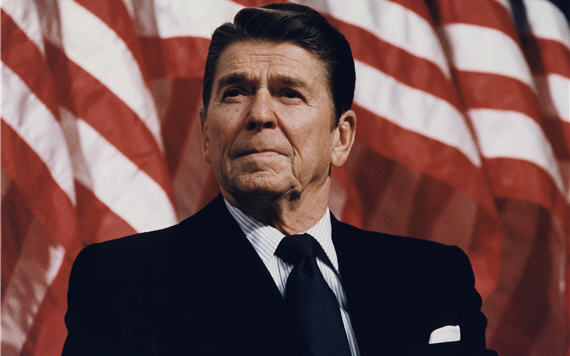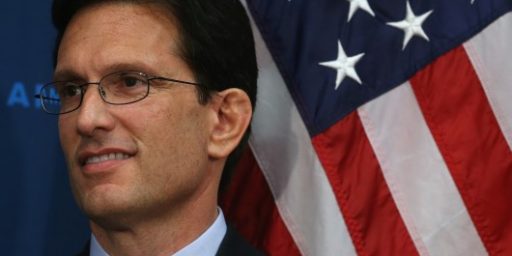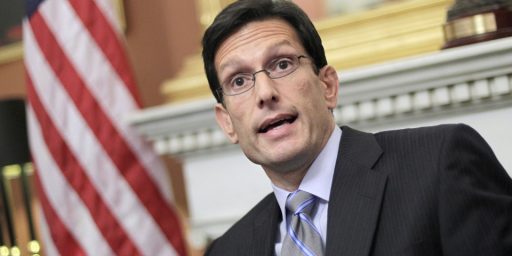Yes Eric Cantor, Ronald Reagan Did Compromise And Raise Taxes
Steve Benen points to this interesting exchange from yesterday’s 60 Minutes profile of House Majority Leader Eric Cantor (I’ve cued up the Youtube embed to start at the 10:09 mark, but you can watch the whole thing if you’d like):
Given his upbringing and his marriage, Cantor says he’s nothing like the intractable obstructionist the Democrats say he is.
Cantor: Nobody gets everything they want. And so–
Stahl: That’s just exactly your image: that you want only what you want.
Cantor: But it’s just I hope I’m not coming across like that now, because it’s just not who I am. I mean, it really is–
Stahl: So are you ready to compromise?
Cantor: So I have always been ready to cooperate. I mean, if you go back to the first–
Stahl: What’s the difference between compromise and cooperate?
Cantor: Well, I would say cooperate is let’s look to where we can move things forward where we agree. Comprising principles, you don’t want to ask anybody to do that. That’s who they are as their core being.
Stahl: But you know, your idol, as I’ve read anyway, was Ronald Reagan. And he compromised.
Cantor: He never compromised his principles.
Stahl: Well, he raised taxes and it was one of his principles not to raise taxes.
Cantor: Well, he– he also cut taxes.
Stahl: But he did compromise–
Cantor: Well I –
[Press Secretary: That just isn’t true. And I don’t want to let that stand.]
And at that point, Cantor’s press secretary interrupted, yelling from off camera that what I was saying wasn’t true.
[Reagan: My fellow Americans…]
There seemed to be some difficulty accepting the fact that even though Ronald Reagan cut taxes, he also pushed through several tax increases, including one in 1982 during a recession.
[Reagan: Make no mistake about it, this whole package is a compromise.]
Of course, Leslie Stahl is right and Eric Cantor, and his Press Secretary, are wrong. Not counting minor tax adjustments contained in miscellaneous bills passed over the course of Reagan’s eight years, there were at least four major bills which President Reagan signed into law which increased taxes:
- The Tax Equity And Fiscal Responsibility Act of 1982 which was described at the time as the largest tax increase in American history. TEFRA accomplished this largely by cancelling out several tax cuts that had been included in The Economic Recovery Tax Act of 1981, President Reagan’s signature fiscal package of his first year in office. TEFRA was necessitated by the decline in revenue caused by the ongoing recession, and it was supported by President Reagan;
- The Highway Revenue Act of 1982 increased the Federal Gasoline Tax by more than 100% (from 4 cents per gallon to 9 cents per gallon) and lasted until September 1988
- The Consolidated Omnibus Budget Reconciliation Act Of 1985 changed the rules under which employer provided health plans would be tax deductible, thus increasing taxes for employers who failed to comply with the rules; and,
- The Tax Reform Act Of 1986 lowered tax rates but also eliminated tax shelters and a broad range of deductions, including the tax deduction for credit card interest, and expanded to application of the Alternative Minimum Tax (AMT) so that it now applies to more middle class families than ever before.
So, yes, Reagan compromised and he raised taxes. Because he was more concerned about actually governing than proving some ideological point.







An inconvenient truth. Someone should make a film.
It’s stuff like this that makes it impossible to take Cantor seriously. Indeed, it gets to the core of the GOP’s problem at the moment, which was what you noted: more interest in ideology than in governance.
I also find it creepy when civilians refer to the president as “my Commander-in-Chief” (but that is just a side note).
@Steven L. Taylor:
I’m with you on that. The President is Commander in Chief of the military. Since I’m not in the military, and neither is Eric Cantor, he is not my Commander in Chief, he’s my President.
Belief is all that is required. Is sustains the modern GOP. Clearly Stahl was talking about some other Reagan, his son perhaps, those girls and their maps…
Thanks for this link…I wanted to watch but was more interested in football at the time.
I really cannot get past the fact that so much of what Republicans believe…and what they base their ideology on…is just flat out wrong.
The beauty of the Conservative Movement for me is/was that you recognize and accept the world as it is and then work within the system to make changes and achieve your goals. This is diametrically opposed to the Republican party we see today. They make up their own facts…and will gladly burn down the system in order to achieve their ends. Given the American Revolution and the French Revolution a Conservative chooses the American…today’s Republican, with no sense of irony, would choose the French.
@James in LA: They’re talking about the mythical Ronald Reagan that they’ve created in an effort to justify their own ends. If, at some point, they find that they can no longer deny that Mr. Reagan actually did what history proves he did, look to see a de-Reaganization of the party while they lay the groundwork for the next True Leader.
Cue some “conservative” commentater who will remind us on how (a) Regan was duped into raising taxes and immigration reform by duplicitous dems and (b) if he had known how both would ruin the country he would have told Tip O’Neill to ‘eff himself.
Eric Cantor is the new Joe McCarthy.
@Hey Norm:
I really like the analogy. Nice one!
@ Ryon…
The analogy actually comes from Burke…one of the founders of the Conservative movement.
Moments like these are when I regard the modern GOP as both unserious and dangerous.